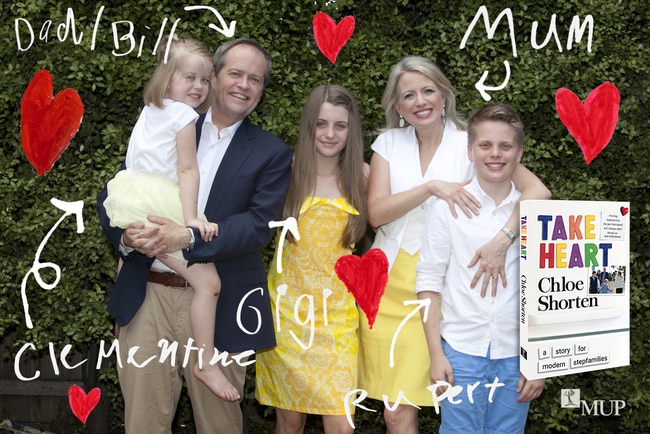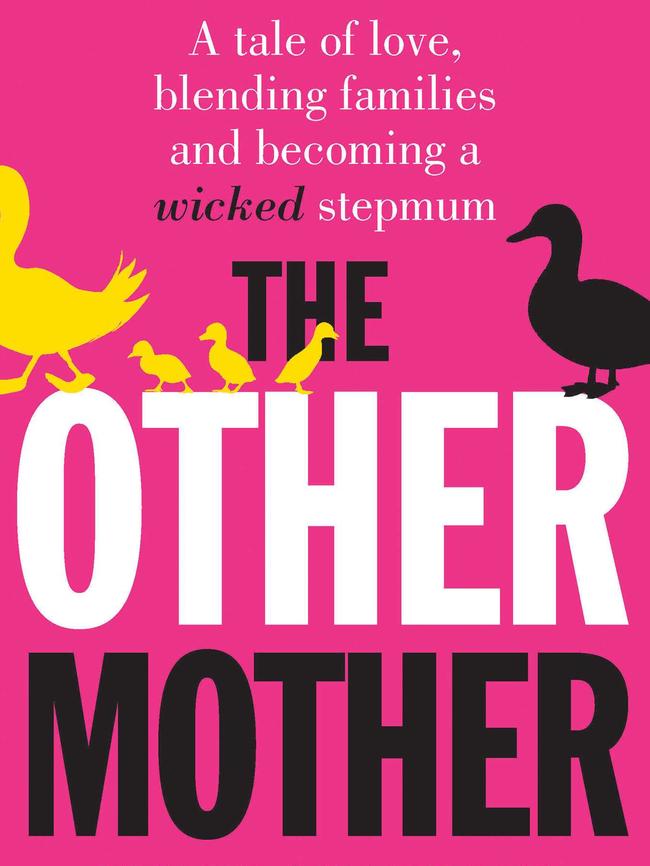Take Heart and The Other Mother address trials of stepfamilies
Stepfamilies now make up about 28 per cent of all Australian families, and the proportion is similar across the West.

Stepfamilies — or “complex” families in the new jargon — are increasingly common. They comprise about 28 per cent of all Australian families, and the proportion is similar across the West.
The main factor driving the existence of stepfamilies today — no-fault divorce — is relatively recent. Yet stepfamilies have been a ubiquitous phenomenon throughout most of human history. In earlier eras second marriages were frequent because many adults died young: women in childbirth, for example, and men in war. George Washington was a stepfather and Jesus of Nazareth was raised by one (admittedly his circumstances were unique).
Two new books explore this important subject in a modern Australian context.
Chloe Shorten, wife of federal Labor leader Bill Shorten, has written one of them, Take Heart, in which she draws on “deeply personal experience”. When she and Bill wed in November 2009, Chloe brought two children from her first marriage (Rupert, then 7, and Georgette, 6) and was pregnant with Bill’s baby. Clementine was born just weeks later. As Bill is apparently fond of saying: “I went from zero kids to three.” His first marriage had been childless, so (in his second wife’s words) he was “on training wheels”.
Huge challenges confront all stepfamilies. About 60 per cent disintegrate inside five years, on the break-up of the second marriage. But as Shorten explains, her own stepfamily began in circumstances that were even more difficult than most: it was “blast-furnace-level character building”. Both Bill and her mother, then governor-general Quentin Bryce, were public figures. On top of the media attention, some of it nastily prurient, Shorten coped with a move to Melbourne from her native Brisbane and a switch from satisfying full-time work to stay-at-home motherhood.
Desperately wishing to avoid failure, she sought out information on stepfamilies and unearthed a lot of academic research (most of it from overseas). But there was a dearth of accessible books. She wrote Take Heart because “the book I was searching for wasn’t there”.

Melbourne author Kelly Chandler was similarly motivated. In late 2011, when she became a de facto stepmother of two small boys (Harry, 5, and Charlie, 2), she “couldn’t find books written by any of the people I trusted”. She explains in The Other Mother: “I wanted to know how such families survived and flourished.”
Chandler’s readjustment was not played out in the public eye. But in other respects it was even more complicated than Shorten’s. As a teenager she had cold-shouldered her own stepmother (Fiona) for 13 years. Before becoming involved with Pete (her former boss, the father of Harry and Charlie), she had never mothered or looked after children. Her most recent long-term relationship was with a woman.
Pete remained on good terms not only with his ex-wife Jane but also with Jane’s parents. Before long Chandler found herself at regular dinners with Pete’s “ex-in-laws”, saintly sounding people known to all as Granny Jenny and Grandpa Roy. Yet it has all worked out well. In 2013 Chandler and Pete got married and now have their own child as well, a boy named Albie. Chandler’s memoir of how they got there “isn’t a how-to or a how-not-to book, although readers who are looking for clues might accidentally find some along the way”.
The central theme of both books is that, like it or not, stepfamilies are a basic feature of Australian life. “We need,” Shorten writes, “broad understanding that the health of these microsystems is vital to our national wellbeing.” Thus, the aim of public policy ought to be “valuing families”, rather than promoting narrow (nuclear) family values. Lingering cultural stereotypes are unhelpful, she believes, and Australia would do well to establish an equivalent of the Stepfamily Association of America.
Chandler’s world view is similar. She is an artful writer — more polished and witty than the earnest Shorten — though prone to sharing a few details too many. But perhaps that is the point. If you really want to learn about the nitty-gritty of step-parenting — bodily functions, household chores, sleeping arrangements, vasectomies, petty jealousies, scheduling negotiations, you name it — then The Other Mother is the book for you.
And Chandler’s way with words is a frequent delight. She muses at one stage about the unfair cultural treatment of stepmothers down the ages. “Cinderella’s stepmum probably had her own stuff going on: stuff that wasn’t addressed in the fairytale. Maybe Cinderella crumbled too many muffins all over the clean floor and she couldn’t hack it anymore,” she writes.
For step-parents and stepchildren seeking useful advice, there is much to garner from The Other Mother and Take Heart. For me, three central lessons stood out.
First — and though this is scarcely rocket science, it bears stressing — the health of the new marriage is key. It is, as Shorten puts it, “the fundamental building block on which everything else sits”. As a politician, Bill Shorten fairly may be criticised for many things but as a second-time husband he has evidently triumphed: the author writes of her “unshakable faith in Bill’s love for me”. The bond between Kelly Chandler and Pete also seems very strong.
A second lesson is that all new step-parents must tread very carefully vis-a-vis their spouse’s children. In Shorten’s words, it is “a mistake to assume that everyone will just get along”, and almost always disastrous to attempt to become an instant replacement for the other natural parent. At least in the early years, a step-parent should impose discipline sparingly, if at all. The emphasis must be on building a warm and trusting relationship. Chandler confesses enormous respect for the stepmother she treated so cruelly: “Fiona had never once raised her voice at me or tried to discipline me, and I marvelled now at her reticence.”
The third lesson I took away is that there are potentially enormous benefits for stepfamilies in maintaining civil dealings with ex-spouses. Bill Shorten emerges well on these counts too. According to his wife, he has approached his step-parenting task in a generous, level-headed way and is now especially close to Rupert. He also has forged a respectful rapport with Chloe’s first husband, architect Roger Parkin.
If there is a lacuna in Take Heart, it is that Shorten writes nothing at all about Bill’s first wife, Deborah Beale. True, Beale is not in a step-parenting role, but it is hard to imagine that she has not been a continuing factor in the family dynamics. No doubt keen sensitivities were involved.
That said, the book is far from a whitewash. For the most part Shorten is bravely honest, and she is certainly hardest on herself. She admits to having felt a sense of defeat, even “mourning”, when her first marriage ended; to “naivety” in the early stages of her relationship with Bill; to excessively “fierce and defensive” mothering at times; and, more recently, to feeling judged by her older children. “Bill and I live under the quiet, sometimes brooding microscope of the teen gaze.”
As I have said, no criticism whatever can be levelled at Chandler on the score of lack of candour (though she did change a few names).
Overall these are instructive and uplifting tales. How to gauge a stepfamily’s success? It would be hard to go past the response of seven-year-old Clementine Shorten to a recent question from her mother: “What’s it like being in a stepfamily?” Clementine replied: “What’s that?”
Roy Williams is a Sydney-based author and stepfather of three girls.
Take Heart: A Story for Modern Stepfamilies
By Chloe Shorten
MUP, 189pp, $32.99
The Other Mother
By Kelly Chandler
Affirm Press, 274pp, $29.99



To join the conversation, please log in. Don't have an account? Register
Join the conversation, you are commenting as Logout